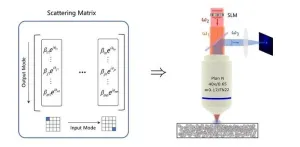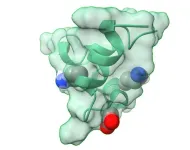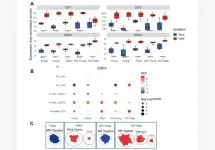Published in Psychological Medicine and led by researchers from the Institute of Psychiatry, Psychology & Neuroscience (IoPPN), King’s College London, this is the first study to investigate the links between depression and inflammation in patients with obesity before and after bariatric surgery. The analysis showed a strong relationship between depression and inflammation in obese patients before and after surgery and it indicated that it was increased inflammation, rather than depression that was driving poor weight loss after bariatric surgery.
Lead author and Clinical Professor of Psychoneuroimmunology at IoPPN, King’s College London, Valeria Mondelli, said: "Our study has important clinical implications as it identifies specific targets for future personalised interventions which could improve physical and mental health outcomes after bariatric surgery. For example, our data showing that increased inflammation predicts lower weight-loss after bariatric surgery suggests that personalised treatments involving approaches that lower inflammation could enable better outcomes after surgery.”
Obesity costs the NHS around £6 billion a year, and this figure is predicted to rise to £9.6 billion per year by 2050. Bariatric surgery physically alters the stomach and/or the bowel to reduce the amount of food people can eat and to reduce the absorption of nutrients: obese patients can lose up to 70 per cent of excess weight after surgery but there is variation in the outcomes. To help patients with obesity and ensure costly treatments are as effective as possible (private bariatric surgery can cost £4,000 to £10,000), it is important to understand the factors that can influence surgery.
Depression and obesity are known to often occur together, and previous research suggests the release of inflammatory proteins as part of the immune response may be a shared disease mechanism that is driving both conditions. To improve the understanding of this relationship and its potential role in obesity and bariatric surgery outcomes, the study investigated the differences in proteins released in the body during inflammation between obese patients with and without depression undergoing surgery.
The 85 participants in the study, enrolled from King’s College Hospital NHS Foundation Trust in south London, were all obese (BMI >35) and part of the ongoing Bariatric Surgery & Depression study.. Levels of proteins released during inflammation, such as C-Reactive Protein (CRP) and cytokines, such as interleukin-6 (IL-6) and interleukin-4 (IL-4), were measured before and after surgery in participants’ blood and tissue.
Before surgery, 41 participants had symptoms of depression that reached the threshold of a clinical diagnosis, while in the remaining 44 participants, the symptoms of depression were below this threshold. The study showed that those with depression had higher levels of the inflammatory proteins CRP and IL-6 in the blood and lower levels of the anti-inflammatory protein IL-4. They also had higher levels of one inflammatory protein in their adipose tissue.
Six months after surgery, the bariatric patients who had depression before surgery continued to have higher levels of IL-6 and CRP in the blood, despite no difference in weight loss between those with and without depression.
Overall bariatric surgery led to weight loss in all patients in line with what is expected , and the majority of patients who previously had depression before surgery also experienced a reduction in their symptoms so that they were no longer considered clinically depressed. Out of 44 patients who had depression before surgery, 29 completed the six-month follow-up and only about one-third (34.5 per cent;10 patients) of those still had clinical depression after surgery.
Researchers analysed whether measures of inflammation and depression before surgery might be able to predict weight loss and depression after surgery. This showed that higher levels of CRP predicted reduced weight loss at six-month follow-up. However, levels of CRP in the blood before surgery did not predict levels of depression afterwards; instead, this was predicted by depression before surgery and experience of childhood trauma.
First author Dr Anna McLaughlin, Postdoctoral Research Associate at IoPPN, King’s College London, said "Our study is the first to show that inflammation levels in the blood, rather than depression, play a significant role in weight loss outcomes after bariatric surgery. Additionally, our research aligns with previous findings, emphasising that patients with childhood trauma may benefit from more psychological support after surgery. As we move forward, combining inflammation data with clinical insights will be crucial to pinpointing risk factors and improving outcomes for bariatric patients."
‘Peripheral inflammation associated with depression and reduced weight loss: a longitudinal study of bariatric patients’ by McLaughlin, A. P et al was published in Psychological Medicine. Doi: 10.1017/S0033291723002283
After the embargo lifts the paper will be available online: https://doi.org/10.1017/S0033291723002283
For more information and to receive an embargoed copy of the paper please contact:
Franca Davenport, Communications and Engagement Manager (part-time), NIHR Maudsley Biomedical Research Centre, franca.davenport@kcl.ac.uk Tel: ++ 44 (0) 7976 918968
Alex Booth, Communications and Engagement Manager (part-time), NIHR Maudsley Biomedical Research Centre, alex.booth@kcl.ac.uk
Notes to editors
The paper is under strict embargo until Friday 1 September 2023 00:01 UK time
The labels have been added to this press release as part of a project run by the Academy of Medical Sciences seeking to improve the communication of evidence. For more information, please see: http://www.sciencemediacentre.org/wp-content/uploads/2018/01/AMS-press-release-labelling-system-GUIDANCE.pdf
The National Institute for Health and Care Research (NIHR)
The mission of the National Institute for Health and Care Research (NIHR) is to improve the health and wealth of the nation through research. We do this by:
Funding high quality, timely research that benefits the NHS, public health and social care;
Investing in world-class expertise, facilities and a skilled delivery workforce to translate discoveries into improved treatments and services;
Partnering with patients, service users, carers and communities, improving the relevance, quality and impact of our research;
Attracting, training and supporting the best researchers to tackle complex health and social care challenges;
Collaborating with other public funders, charities and industry to help shape a cohesive and globally competitive research system;
Funding applied global health research and training to meet the needs of the poorest people in low and middle income countries.
NIHR is funded by the Department of Health and Social Care. Its work in low and middle income countries is principally funded through UK Aid from the UK government.
About King’s College London and the Institute of Psychiatry, Psychology & Neuroscience
King's College London is one of the top 35 UK universities in the world and one of the top 10 in Europe (QS World University Rankings, 2020/21) and among the oldest in England. King’s has more than 31,000 students (including more than 12,800 postgraduates) from some 150 countries worldwide, and 8,500 staff. King's has an outstanding reputation for world-class teaching and cutting-edge research. The Institute of Psychiatry, Psychology & Neuroscience (IoPPN) at King’s is the premier centre for mental health and related neurosciences research in Europe. It produces more highly cited outputs (top 1% citations) on mental health than any other centre (SciVal 2019) and on this metric we have risen from 16th (2014) to 4th (2019) in the world for highly cited neuroscience outputs. World-leading research from the IoPPN has made, and continues to make, an impact on how we understand, prevent and treat mental illness and other conditions that affect the brain.
www.kcl.ac.uk/ioppn @KingsIoPPN
King’s College Hospital NHS Foundation Trust
King’s College Hospital NHS Foundation Trust is one of the UK’s largest and busiest teaching hospitals. The Trust is recognised internationally for its work in liver disease and transplantation, neurosciences, cardiac, haemato-oncology, fetal medicine, stroke and major trauma.
2. Our hospitals include King’s College Hospital (Denmark Hill), the Princess Royal University Hospital (PRUH), and Orpington Hospital – we also provide some services at Beckenham Beacon and Queen Mary’s Hospital, Sidcup.
3. We provide care to 1.5 million patients in Southwark, Lambeth, Bromley, Bexley, Lewisham and elsewhere in south-east London and parts of Kent. In July, we launched our new strategy, Strong Roots, Global Reach, and our new vision to be BOLD.
END




